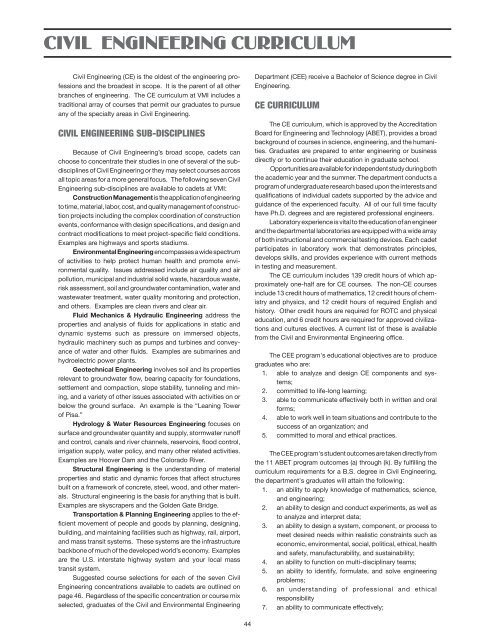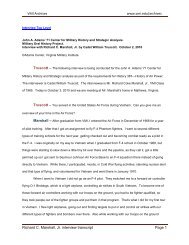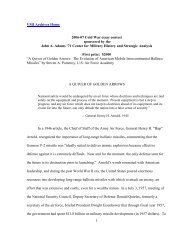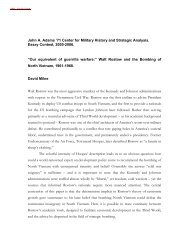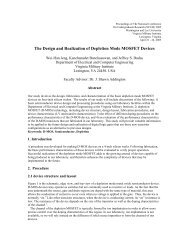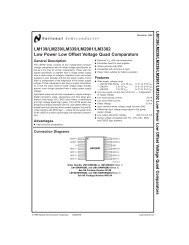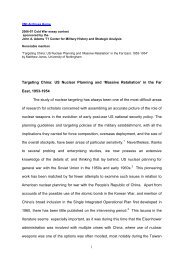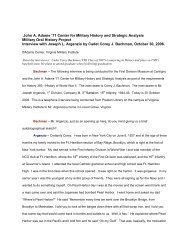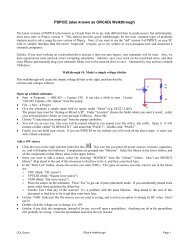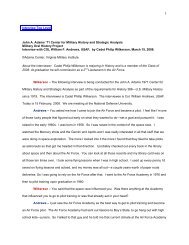Academic Catalog - Virginia Military Institute Admissions
Academic Catalog - Virginia Military Institute Admissions
Academic Catalog - Virginia Military Institute Admissions
Create successful ePaper yourself
Turn your PDF publications into a flip-book with our unique Google optimized e-Paper software.
CIVIL ENGINEERING CURRICULUM<br />
Civil Engineering (CE) is the oldest of the engineering professions<br />
and the broadest in scope. It is the parent of all other<br />
branches of engineering. The CE curriculum at VMI includes a<br />
traditional array of courses that permit our graduates to pursue<br />
any of the specialty areas in Civil Engineering.<br />
Civil Engineering Sub-disciplines<br />
Because of Civil Engineering’s broad scope, cadets can<br />
choose to concentrate their studies in one of several of the subdisciplines<br />
of Civil Engineering or they may select courses across<br />
all topic areas for a more general focus. The following seven Civil<br />
Engineering sub-disciplines are available to cadets at VMI:<br />
Construction Management is the application of engineering<br />
to time, material, labor, cost, and quality management of construction<br />
projects including the complex coordination of construction<br />
events, conformance with design specifications, and design and<br />
contract modifications to meet project-specific field conditions.<br />
Examples are highways and sports stadiums.<br />
Environmental Engineering encompasses a wide spectrum<br />
of activities to help protect human health and promote environmental<br />
quality. Issues addressed include air quality and air<br />
pollution, municipal and industrial solid waste, hazardous waste,<br />
risk assessment, soil and groundwater contamination, water and<br />
wastewater treatment, water quality monitoring and protection,<br />
and others. Examples are clean rivers and clear air.<br />
Fluid Mechanics & Hydraulic Engineering address the<br />
properties and analysis of fluids for applications in static and<br />
dynamic systems such as pressure on immersed objects,<br />
hydraulic machinery such as pumps and turbines and conveyance<br />
of water and other fluids. Examples are submarines and<br />
hydroelectric power plants.<br />
Geotechnical Engineering involves soil and its properties<br />
relevant to groundwater flow, bearing capacity for foundations,<br />
settlement and compaction, slope stability, tunneling and mining,<br />
and a variety of other issues associated with activities on or<br />
below the ground surface. An example is the “Leaning Tower<br />
of Pisa.”<br />
Hydrology & Water Resources Engineering focuses on<br />
surface and groundwater quantity and supply, stormwater runoff<br />
and control, canals and river channels, reservoirs, flood control,<br />
irrigation supply, water policy, and many other related activities.<br />
Examples are Hoover Dam and the Colorado River.<br />
Structural Engineering is the understanding of material<br />
properties and static and dynamic forces that affect structures<br />
built on a framework of concrete, steel, wood, and other materials.<br />
Structural engineering is the basis for anything that is built.<br />
Examples are skyscrapers and the Golden Gate Bridge.<br />
Transportation & Planning Engineering applies to the efficient<br />
movement of people and goods by planning, designing,<br />
building, and maintaining facilities such as highway, rail, airport,<br />
and mass transit systems. These systems are the infrastructure<br />
backbone of much of the developed world’s economy. Examples<br />
are the U.S. interstate highway system and your local mass<br />
transit system.<br />
Suggested course selections for each of the seven Civil<br />
Engineering concentrations available to cadets are outlined on<br />
page 46. Regardless of the specific concentration or course mix<br />
selected, graduates of the Civil and Environmental Engineering<br />
Department (CEE) receive a Bachelor of Science degree in Civil<br />
Engineering.<br />
CE Curriculum<br />
The CE curriculum, which is approved by the Accreditation<br />
Board for Engineering and Technology (ABET), provides a broad<br />
background of courses in science, engineering, and the humanities.<br />
Graduates are prepared to enter engineering or business<br />
directly or to continue their education in graduate school.<br />
Opportunities are available for independent study during both<br />
the academic year and the summer. The department conducts a<br />
program of undergraduate research based upon the interests and<br />
qualifications of individual cadets supported by the advice and<br />
guidance of the experienced faculty. All of our full time faculty<br />
have Ph.D. degrees and are registered professional engineers.<br />
Laboratory experience is vital to the education of an engineer<br />
and the departmental laboratories are equipped with a wide array<br />
of both instructional and commercial testing devices. Each cadet<br />
participates in laboratory work that demonstrates principles,<br />
develops skills, and provides experience with current methods<br />
in testing and measurement.<br />
The CE curriculum includes 139 credit hours of which approximately<br />
one-half are for CE courses. The non-CE courses<br />
include 13 credit hours of mathematics, 12 credit hours of chemistry<br />
and physics, and 12 credit hours of required English and<br />
history. Other credit hours are required for ROTC and physical<br />
education, and 6 credit hours are required for approved civilizations<br />
and cultures electives. A current list of these is available<br />
from the Civil and Environmental Engineering office.<br />
The CEE program's educational objectives are to produce<br />
graduates who are:<br />
1. able to analyze and design CE components and systems;<br />
2. committed to life-long learning;<br />
3. able to communicate effectively both in written and oral<br />
forms;<br />
4. able to work well in team situations and contribute to the<br />
success of an organization; and<br />
5. committed to moral and ethical practices.<br />
The CEE program's student outcomes are taken directly from<br />
the 11 ABET program outcomes (a) through (k). By fulfilling the<br />
curriculum requirements for a B.S. degree in Civil Engineering,<br />
the department's graduates will attain the following:<br />
1. an ability to apply knowledge of mathematics, science,<br />
and engineering;<br />
2. an ability to design and conduct experiments, as well as<br />
to analyze and interpret data;<br />
3. an ability to design a system, component, or process to<br />
meet desired needs within realistic constraints such as<br />
economic, environmental, social, political, ethical, health<br />
and safety, manufacturability, and sustainability;<br />
4. an ability to function on multi-disciplinary teams;<br />
5. an ability to identify, formulate, and solve engineering<br />
problems;<br />
6. an understanding of professional and ethical<br />
responsibility<br />
7. an ability to communicate effectively;<br />
44


